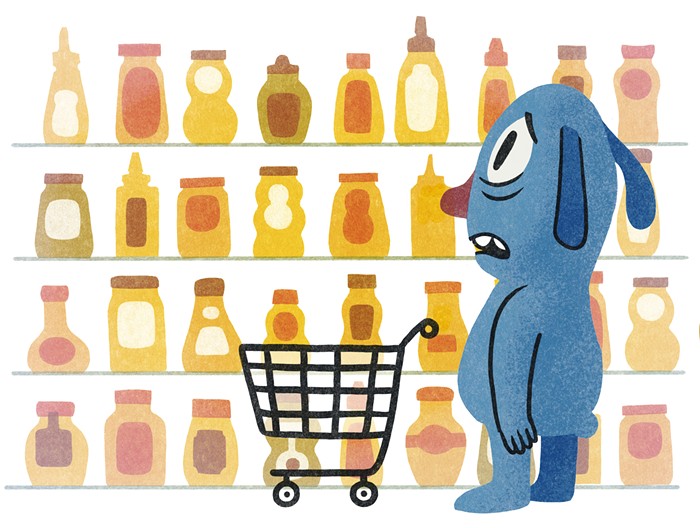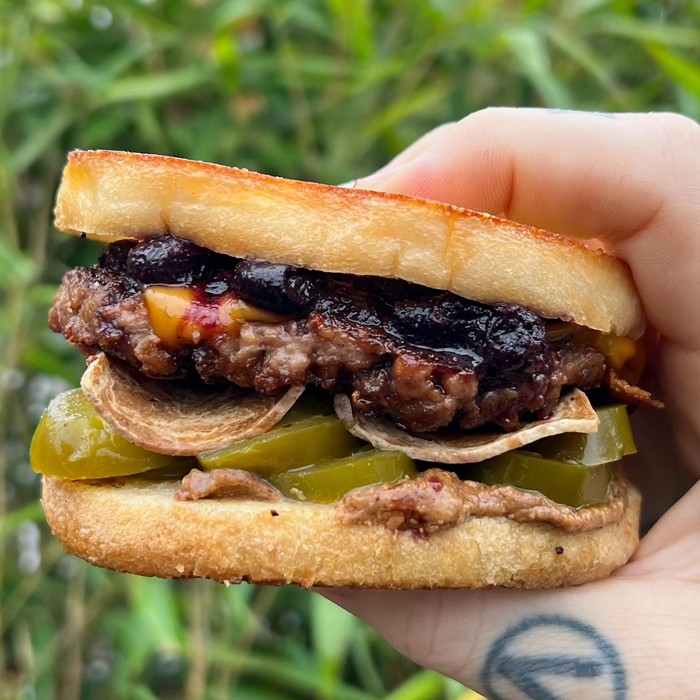I ONCE OWNED a 1975 Mercedes coupe. I loved that car. It was fashionable, smooth, and uncommonly sleek in spite of its slightly run-down condition. It had character.
Driving that car made me wonder what it must be like to pilot an ultra-modern Mercedes—all that precision at your fingertips, those sleek lines, the sense of power. I imagine it would be something like eating at Grüner.
Of course, I could be making the link simply because the cuisine at Grüner is what the proprietor calls "Alpine cuisine," which will be pure gibberish to people who'd rather not decode the phrase. In essence it's food that leans ever so casually on German traditions and recalls the high altitude (and fantastically drivable) climes that course through Europe's midsection. Alpine cuisine. Sure.
Much like a modern Mercedes, Grüner is packed with class, control, and style. It's ordered, clean, bright, and thoroughly modern. The dining room sports soft blond wood, napkins folded just so, and minimal embellishment, save for the occasional aspen pole or tasteful flower arrangement.
The staff is efficient, working like a well-tuned engine. Service is professional and appropriately caring. Plates are expedited with the timing of a $1,000 platinum watch. There seemed to be some variables, though—one night there was complimentary bread and pretzel, another night there was not; one night saw new plates and silverware between courses, another night did not—the service remained impeccable.
The food follows suit. The dishes are straightforward and mannered: The menu features a mountain meadow's worth of flora and fauna tamed into aesthetically gorgeous dishes that, on the balance, do not skimp on flavor.
An appetizer of maultsachen—pork-and beef-filled Swabian dumplings, like tidy square ravioli—swim in a bowl of delicate, crystal-clear beef broth with tendrils of chives. Inside these fine, firm packets, the ground beef and pork filling is bold, savory, and satisfying.
A terrine of rabbit and foie gras is ridiculously decadent, but not so much as to lose its poise. The neat rounds of meat and liver offer just enough gamey rabbit tones and lush iron-tinged foie flavors, touched by a hint of fat. Pickled asparagus and carrot add a vinegar tension to the plate, but the silly frisée works only for looks, being otherwise too bitter.
For mains, a grilled trout is understated, but still excellent beneath butter, a drizzle of lemon, and a small pile of almond shavings. Admittedly, the pickles sharing the plate make the bolder statement.
The spätzle is very good: Just about everything works, from the lovely sighs of tarragon and Riesling over crème fraiche and crispy shallots, to the contrasting texture of big green fava beans, to the tender rabbit, which I wish had been a bit more plentiful and flavorful.
Chicken schnitzel, unfortunately, is not one of the standouts. Though the crust has an awesome crispness, and the meat beneath it is very tender, the dish is overpowered by the breading's odd, almost yeasty flavor, undiminished by the very tasty red-wine-poached bing cherries along for the ride. Also, in terms of presentation it's ho-hum.
With all that's good about Grüner there's something missing. Considering these tamed ingredients, I would have liked a just little wildness to come through—maybe a rough edge here and there to add a bit more interest.
I mean, even the (yes, delicious) burger was a tower of polished, engineered cuisine. Sure, I lifted the thing from a shallow pool of clear fat, which was unpleasant, and the bacon had a nice bit of wild campfire smoke, but in total it was a buttoned-up lunchtime treat.
Strange, then, that the checks should arrive tucked inside careworn paperbacks of German classics. One trip found a passage by the Brothers Grimm featuring all manner of devouring beasts, another revealed a passage from Faust about untamable passion, and yet another found me staring down at a description of the rocky crags and boulder-strewn passages of the Alpine mountains which inspired the food I'd just eaten.
Maybe the point of eating at Grüner, or driving a luxurious Mercedes, is that for a brief period you are pulled out of the world's chaos and hardship. And perhaps it's just me, but I'd rather not be too far removed from the roughness of the world—because that roughness is where the character really lives. Which is why I loved my old, slightly beat-up Mercedes.
I will admit though, that there is still a thrill in cruising through Grüner's Alps. It's just not something I'd want to do every day.



















